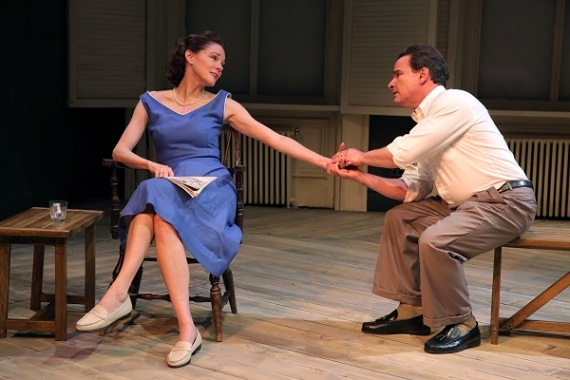Family Furniture

(© Joan Marcus)
Keeping your life organized and under control is a bit like rearranging your living room. That's the underlying theme of A.R. Gurney's deceptively quiet new play, Family Furniture, directed by Thomas Kail and receiving its world premiere at The Flea Theater. While Gurney's tale seems to advocate forgiveness and understanding in dealing with life's challenges, the play ultimately reveals itself as a commentary on how we maintain the status quo by hiding secrets and ignoring truths about ourselves and those we love.
The scene is 1950s Buffalo, near the Canadian shore of Lake Erie. There, the Protestants live exemplary lives in culturally literate, congenially bigoted households where everyone can quote a line or two of Shakespeare or Byron and knows how to make a martini on the rocks. Nicky's mom, Claire (Carolyn McCormick), has gone to New York, and his dad, Russell (Peter Scolari), is worried that something has happened to her in that dangerous city because it's midnight and she hasn't called. But Nicky (Andrew Keenan-Bolger) soon learns from his sister, Peggy (Ismenia Mendes), that their mother might be having an affair with another man, a friend of the family named Howard.
Claire soon returns safe and sound from New York. Nicky, a bit of a hothead, has no problem acting out his anger about his mother's possible infidelity whenever provoked, insulting Howard on the tennis court and getting into fights. Meanwhile, Peggy has problems of her own. She's dating an Italian, Marcos, whom we never meet. Russell isn't too keen on the guy. Italians are an ill-mannered race when they're out of their native Italy, prone to criminal activity and so on. Besides, successful relationships, like his and Claire's, are built on foundations of common backgrounds. Russell thinks a trip to Italy will broaden Peggy's horizons. She agrees to go, but upon her return Peggy reveals that something happened to her on the trip that could endanger her relationship with Marcos. Russell steps in with some very practical advice regarding how to handle the situation.
It's here that we get to the heart of Russell's character. "In our family we like to think that we grow and thrive when we're confronted with adversity," he says. What he really means is that Peggy can meet her troubles head on with Dad's help, and Marcos need never know a thing. That, you see, is the way things work in life. We clean up messes quickly and quietly, return the upset furniture to an upright position, and no one need ever be the wiser, not even those we've sworn to love, honor, and cherish. (Who said anything about honesty?)
We're left wondering, then, if Russell is aware of his wife's infidelity? Maybe he is, and that's the reason he's willing to give Marcos a pass if Peggy really feels strongly about him. Same with Nick's girlfriend, Betsy (Nolly Nordin), who happens to be Jewish. After all, it's better to seem magnanimous, because you'll need to save face if your own embarrassments come out.
Scolari completely inhabits this role as the stiff, stereotypical 1950s dad who wants nothing more than to keep things nice and quiet. He's a pleasure to watch, and he gets many of the best laughs. McCormick delivers a wonderful performance as a housewife who has learned how to wear the mask of middle-class respectability as she hides her true self from her family. Keenan-Bolger looks like a handful of dynamite that's one spark away from exploding, and the enormously talented Mendes lends complete believability to Peggy's plight. Nordin, in a smaller role, also delights as the charming instigator Betsy, who's determined to get the truth out of people by any means necessary.
The simple set design by Rachel Hauck — three large windows and several unremarkable benches that serve as furniture and, in one scene, a boat — mirrors the deceptive simplicity of the play. The benches are well ordered, and while Peggy and Claire now and then shed tears, everyone's emotions seem relatively well ordered too — but they aren't. In Family Furniture, problems can be handled as long as everyone else has blindfolds on. As Claire tells her son, "People can know and not know, Nicky. And still get along famously."
This is a Darwinian lesson for the modern, civilized world, in which keeping up appearances is a more useful survival mechanism than honesty. Honesty just wrecks things, after all. It's this unseen churning under a placid surface that gives this subtle play its tension. What becomes of a family like this as the years pass and the secrets accumulate? It's hard to imagine a happy ending when you deal with the messy parts of life by sticking them under the seat cushions of the sofa.











